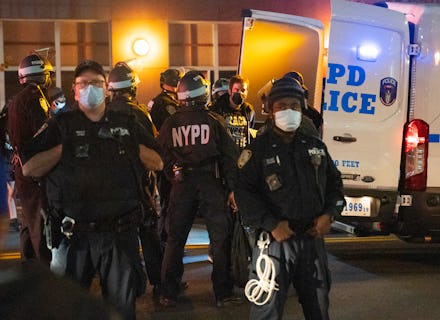Preparing for a protest? Here’s what to know if you get arrested

In the United States, police and carceral systems are nearly impossible to avoid. Interactions with police can range from being stopped when you're walking down the street or pulled over while driving to some people's worst fear: being arrested. If you ever find yourself in a position where you're under arrest, heading into the moment knowing some basic tips — and your rights — may help keep you safe.
You might be thinking that you'd never do anything to be arrested. However, arrest is a lot more common than most people assume. Per the Vera Institute of Justice, somebody is arrested every three seconds in the U.S., with over 80% of arrests being made up of low-level offenses like "drug abuse violations" and "disorderly conduct." And, of course, racial disparities persist. Despite being only 12% of the U.S. population, the organization reported Black people make up 28% of all arrests.
For many, the idea of being arrested is understandably frightening, especially if you are a person of color. Organizations like the American Civil Liberties Union have put together handy know-your-rights documents. But here's quick break down of some of the most important things to keep in mind if you ever end up under arrest.
First, determine if you are actually under arrest
You can be detained or arrested by police — and no, they aren't the same thing.
The difference between the two boils down to legal semantics more than anything else. When you're arrested, you're taken into custody and charged with a crime. If you're detained, there are no official charges. Detainments are supposed to be "brief and cursory," but they can turn into a de facto arrest — so, arrested in practice, even if it's not legally official.
How might this difference look in real life? Let's say police have stopped you while you're waiting on a train platform, and they start questioning you. Nobody has cuffed or done anything to you. At that moment, you may not be under arrest, and you're allowed to ask if you are. Theoretically, if the answer is no, you're able to walk away.
In reality, though, that may not be the best thing to do. My advice? Treat being detained as if you've been placed under arrest. If you end up needing a lawyer, they're the ones who are really going to care about the difference.
If you are, do not resist arrest
All right, disclaimer: I am all for radical action like de-arresting people. But this is general advice. And in most cases — especially if you are by yourself — you should never ever resist police.
Resisting arrest can catch you serious charges, but really I'm more concerned with your safety than anything else. If you resist arrest, you're unlikely to be treated with kid gloves, and as we all know police have a range of weapons. Even if an officer doesn't pull out his gun, he can use a Taser or baton, neither of which feels too good coming at you.
The categories for what constitutes resisting arrest are quite broad. When most people hear the term, they think of somebody doing something like outright swinging on the police. But it can also look like not cooperating when being cuffed, or refusing to walk when and where you are told.
Remember that you have the right to remain silent
Thanks to popular cop shows constantly having officers recite the Miranda rights as somebody is dramatically arrested, this line has become something of a joke. However, it's probably the most important thing for you to remember in any interaction with police.
Your right to silence is guaranteed under the Fifth Amendment. Depending on the situation, police may or may not try to pressure you into speaking. The most you should say is that you would like to speak with a lawyer — and make sure you're very clear with that request. In 2015, a man in custody asked for "a lawyer, dawg." The judge farcically determined that the man asked for a "lawyer dog," so his request wasn't clear, and thus anything he said during the interrogation could be used against him.
The only exception to your silence is providing your name if it is asked of you (and giving a fake one is illegal). Do some research to determine if there's any other information that you are required to give police when arrested in your state.
Figure out your bail situation
Finally, if you are arrested, how the hell are you going to get out? In most cases, you''ll have to pay bail.
The bail amount is set by judges and varies widely. They'll use factors like the charges you're faced with (is it a felony? a misdemeanor?) and whether they think you'll flee before trial. Race also plays a factor, though. Data compiled by The Sentencing Project found that Black and Latinx people get hit with higher bail amounts than white people.
You may be unable to pay your bail, and that's okay. Organizations like the national Bail Project and Believers Bail Out help provide assistance to low-income people and Muslims, respectively. There are also location-specific projects like the Minnesota Freedom Fund and the Brooklyn Community Bail Fund.
If you're arrested spontaneously, you may not have the contact information for these organizations on hand. You can make sure that friends or family do ahead of time. If you're preparing for an activity where arrest is likely (like a protest), part of preparing means you write bail fund numbers on an easily accessible part of your body, such as your arm, in permanent marker. You can connect with organizers for this information; they may even have specific "jail support" to contact. These people will not only organize bail, but also they'll keep track of all arrests so that nobody gets lost in the system.